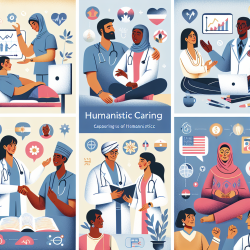Introduction
In the evolving landscape of healthcare, the emphasis on humanistic caring remains paramount. A recent study published in the Canadian Journal of Nursing Research delves into the recommendations by nursing students and nurses to enhance humanistic caring competencies. This blog explores how practitioners, including those in online therapy services like TinyEYE, can harness these insights to improve their practice and outcomes for children.
Understanding Humanistic Caring
Humanistic caring is not just a requirement but a cornerstone of effective healthcare delivery. It involves empathy, compassion, and a genuine connection with patients, transcending mere clinical interactions. The study identifies five key themes to foster this competency: pedagogical strategies, educators' approach, considerations in teaching, work overload, and volunteerism and externship.
Pedagogical Strategies: Enhancing Realism and Engagement
One of the significant findings is the need for realistic and engaging pedagogical strategies. For online therapy practitioners, this translates to creating immersive and interactive sessions that resonate with children's experiences. Incorporating storytelling and simulations can make learning more relatable and impactful, enhancing the therapeutic process.
Educators' Approach: Cultivating a Supportive Environment
The study emphasizes the role of educators in modeling humanistic values. For practitioners, this means fostering a supportive and nurturing environment where children feel valued and understood. Training programs should focus on developing these interpersonal skills, ensuring that therapists can effectively embody and convey empathy and compassion.
Considerations in Teaching: Bridging Theory and Practice
Practitioners are encouraged to bridge the gap between theoretical knowledge and practical application. This involves providing concrete examples and scenarios that illustrate humanistic caring in action. By doing so, therapists can better equip themselves to handle real-world situations with sensitivity and understanding.
Addressing Work Overload: Ensuring Quality Care
Work overload is a common barrier to humanistic caring. The study suggests reducing workload to allow practitioners more time to focus on quality interactions. For online therapy services, this could mean optimizing schedules and resources to ensure therapists can dedicate adequate time to each child's needs.
Volunteerism and Externship: Expanding Horizons
Integrating volunteerism and externship experiences into training can provide valuable exposure to diverse populations and challenges. For practitioners, engaging in community outreach or volunteer activities can enhance their understanding and empathy, enriching their professional practice.
Conclusion
By implementing these recommendations, practitioners can significantly enhance their humanistic caring competencies. This not only benefits their professional growth but also leads to better outcomes for children under their care. As we strive to create more empathetic and effective healthcare environments, embracing these strategies is a crucial step forward.
To read the original research paper, please follow this link: Nursing Students and Nurses’ Recommendations Aiming at Improving the Development of the Humanistic Caring Competency.










